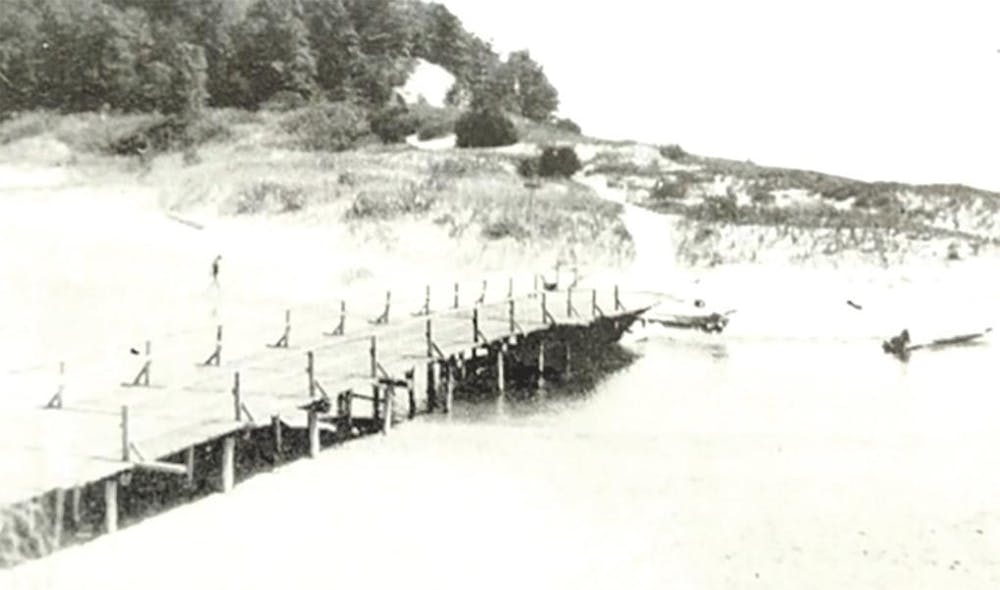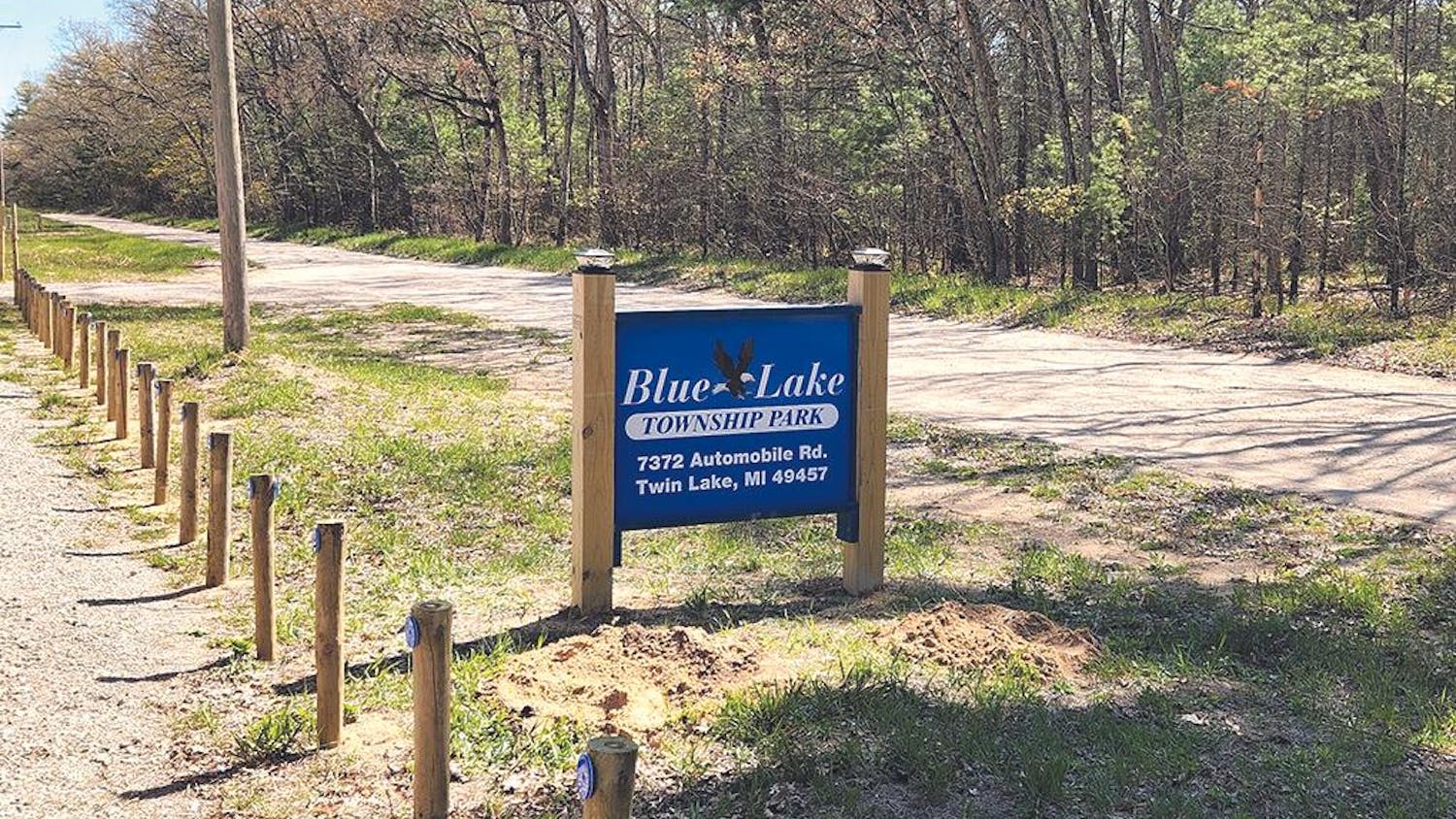In 1836, Charles Mears left his home state of Massachusetts bringing a stock of goods for himself and his brothers Edwin and Nathan at Paw Paw, Michigan. When he came to this area, he built his first lumber mill at the mill pond on White Lake in 1837. He then built a mill at Duck Lake in 1847.
A dam was built at the site of the current Duck Lake bridge to provide power to the mill. The mill consisted of steam and waterpower. Machinery consisted of upright or muley saw, five-foot and two-foot circular machines, lath mill, shingle machine and a machinist’s lathe. There was also a large warehouse or dock for holding supplies, boarding houses, blacksmith shop and stable, and Mears’ cheap cash store, where almost anything could be supplied for cash or trade. Many farmers within a 50-mile radius came to trade. It was also a resting and lodging place for the weary beach travelers consisting of circuit judges of the court, lawyers, land surveyors and land hunters.
The United States Post Office was opened in the Duck Lake store in spring 1856. It was discontinued in July 1858.
A fire in 1859, reportedly started by disgruntled unpaid laborers, destroyed most of the Duck Lake settlement, which was quickly rebuilt.
The shore of Duck Lake was the scene of a terrible encounter Saturday, Aug. 11, 1889. It appeared that one Fred Magnuson, who lived near Duck Lake, had been putting logs into the lake. Nelson M. Clough was leasing the mill that stood at the mouth of the lake and was operated by a water wheel fed by the waters of the lake. There was no outlet into Lake Michigan other than through the mill.
Magnuson made arrangements with Clough to saw his logs, and some of them were sawed at the water mill. Then the water became low, and Clough had to cease sawing. Magnuson was in a hurry for his lumber and trouble developed over the situation. Magnuson threatened to enter the mill and saw the logs himself, but he was driven away by Clough. Then Magnuson said he would run the logs through the chute in the mill and take them to Muskegon. Clough said that shouldn’t be done, as it would damage the mill.
That Saturday, Magnuson hired the tug Col. Ferry at Muskegon and came up the lake with a gang of men for the purpose of taking the logs. They were met at the tramway by Clough, who ordered them away from the premises, and he pushed one of the men, Eugene Bean, out of the way. The gang ascended the tramway and attacked Clough with fists and clubs and Clough was soon overtaken. His wife and mother tried to get him away from the gang and his mother was struck in the face with a club, breaking her nose. Clough was finally dragged out of the way and the gang boarded the tug and returned to Muskegon. Clough’s head was beaten into a bruised mass and a doctor was summoned from Whitehall who found him in serious condition, unable to speak and suffering from a concussion.
Warrants were sworn out for the arrest of the Muskegon gang and the following Monday, officers Hinman and Walker of Whitehall, assisted by Muskegon officers, arrested the offenders: Neal Campbell, captain of the tug; Fred Magnuson, owner of the logs; and Patrick McMann, Hiram Dixon, and James Kane who were parties to the row. The latter four were brought to Whitehall and lodged in the jail. On Tuesday, Capt. Campbell came up with his tug and gave bail for the defendants to appear before Justice Hedges. The charges were assault and battery.
In October 1889, the jury returned a verdict of guilty of assault and battery against all the respondents except Magnuson, who was acquitted. The men were fined $35 or 30 days in jail. Then Nelson Clough was arrested on a complaint made by Eugene Bean, who was involved in the Duck Lake melee, and charged him with assault and battery. In November, the prosecuting attorney stated that he declined to issue a warrant because he did not consider there was a case. Accordingly, the case was dismissed.
In March 1890, in the case of Jane Clough against Fred Magnuson and others, the jury rendered a verdict in her favor, and she was awarded $100.
In 1893, it was reported the Duck Lake mill property caught fire Saturday, Dec. 2 at 1 a.m. and was completely burned together with a large amount of lumber, slabs and edging on the dock. The dock and trainways were also burned. It was one of the oldest mills on the lake, was run by waterpower, and owned by Charles Mears of Chicago. It had been operated for many years by Nelson Clough, who lost all he had with no insurance. There was no insurance on the mill. The loss was several thousands of dollars and caused probably by tramps or hunters.
On Monday, Aug. 8, 1904, at about 2 a.m., Nelson Clough, who resided in the old Charles Mears boarding house on Duck Lake, was awakened by one of his dogs jumping into his bed and barking. When he awoke, he saw flames were breaking through the sides of the bedroom. In his excitement, he threw the dog through the window to safety and grabbed some of his clothes before quickly climbing out of the window and was terror-stricken when he discovered how narrow his escape had been. The old building was all in flames and fell about three minutes after his escape.
The building was erected when Charles Mears built the Duck Lake mill, and it was used as a boarding house. It was the oldest landmark in the vicinity and the last reminder of logging days on the lake. Nelson Clough, his mother and sister had lived in the old boarding house. As the building became unsafe for habitation, he moved a portion of his belongings one Saturday to a nearby farm which he owned. His sister and mother, who was an invalid, were at his new home. Mr. Clough had gone to the old residence to sleep, intending to move the remainder of the furniture and household goods the next Monday morning – but the fire saved him the trouble.
Beginning Sunday night, June 7, 1905, and continuing for almost 48 hours, this section of the county experienced disastrous rainfall flooding streams and lowlands, causing washout and irreparable damage. One of the casualties of the flood was the dam at the mouth of Duck Lake, which resulted in the lowering of the lake level by eight feet.
The dam, built in the 1840s by Charles Mears, had been used to operate a small sawmill. Farmers in the vicinity worked with men and teams to save the dam, which was 400 feet long, but were powerless against the rushing water. Duck Lake was said to be at least a third smaller as a result of the loss of the dam. The land south of the channel was flooded for a distance of 350 feet. A large shed standing on the bank of the channel was washed away and a quantity of farming implements stored in it were damaged or lost. The once beautiful shores of Duck Lake were only stretches of mud flats with a lonely stump sticking up here and there with seaweed and moss. Where the old dam was a portion of channel 100 feet wide now cut through from Duck Lake to Lake Michigan and the bank on one side of the channel was nearly 20 feet high.
Finally, in June 1906, a new bridge across the mouth of Duck Lake was erected to replace the one washed away in the flood the year before. The new bridge was 60 feet in length and 16 feet in width and was built strong and substantial. The bridge was greatly appreciated by the neighboring farmers who sold their produce to Michillinda and Sylvan Beach and who had to find alternate routes to those resorts.
Carrie Mears, Charles Mears’ daughter and only survivor, remained owner of much of the property on Duck Lake. In 1920 ads began to appear in newspapers for ”a fine tract of land formerly belonging to C. Mears and lying on both sides of the mouth of Duck Lake, including a fine wooded frontage on both Duck Lake and Lake Michigan comprising of 100 acres. The land was suitable for a high class summer colony.” The ads were posted by C. Mears of Chicago.
This property was purchased by the Evanston, Illinois Boy Scouts and became Camp Wabaningo from 1920-27. They sold off some of the land to the Grand Rapids Boy Scouts and Camp Shawondosee was formed in 1928. The two groups maintained their camps for about the next 50 years. Scout Camping closed on Duck Lake in early 1970 when the camp sold the property to the Nature Conservancy. In 1974 the State of Michigan acquired the property and in 1988 established Duck Lake State Park.
In the fall of 1900, the Hon. J. J. Gee introduced a bill in Lansing to change the name of Duck Lake to Michillinda Lake. Residents of Michillinda felt the new name would better describe the developing farm produce business of the time. Widespread opposition to the name change prevailed, and it remains Duck Lake to this day.
Over the years, Duck Lake has also been the site of several summer resorts:
Duck Lake Resort (1902-16) – Christ Hesse bought property at the east end of Duck Lake in 1893. He cleared the land and built a three-story house for their family and summer guests, advertising their summer resort in the Chicago Tribune in 1902. The main house had 20 bedrooms, and seven small cottages were also part of the resort, which operated until 1916. The resort was then leased to the YMCA and reopened in 1920, operating for the next decade. Hesse was responsible for building the first bridge over Duck Creek at the head of the lake resulting in a direct route to White Lake and Whitehall. He later gifted the bridge and access property to the township, and it is now Nestrom Road.
Duck Lake Inn (1910-55) – Sometimes referred to as Walters’ Place, the Inn was operated by German immigrants - Henry Walters and his wife Helen. They purchased property next to Hinze Resort. By 1920, the resort included the main two-story house, guest cottages, kitchen & dining building, an icehouse and a dance and pool hall. The Inn was operated until 1955, when Helen died.
Ruben’s Lake Park Resort (1914-37) In 1914 Swedish immigrant brothers Rudolf and Karin Ruben bought four acres on Duck Lake for $600. They built a two-story home and began advertising in the Chicago Daily Tribune for summer vacationers. Over time they added seven small cottages and a dining hall. The resort operated until 1937.
Lake View Farms (1919-1936) – Chris Hinze, a German immigrant, bought his property on Duck Lake in 1898. He cleared the land, established a berry farm and started taking vacationers. By 1920 he had expanded his farmhouse to 14 bedrooms and a dining hall able to seat 125 guests. The resort operated until 1936.














